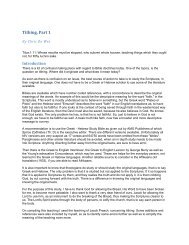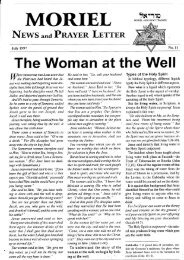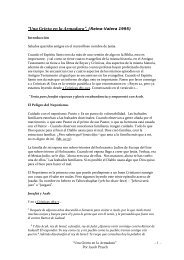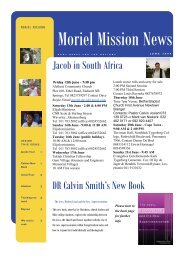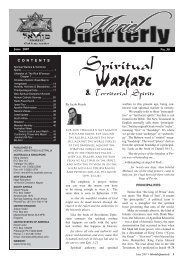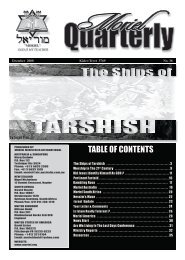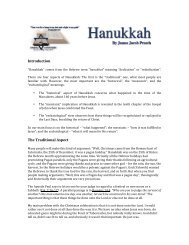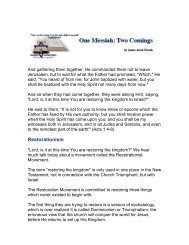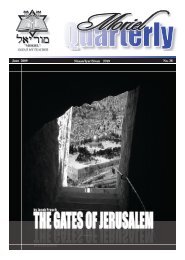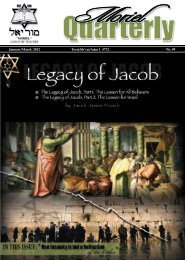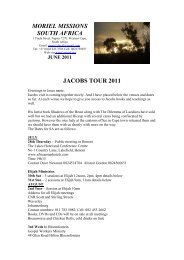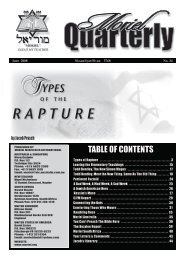The Scarlet Cord - Moriel Ministries
The Scarlet Cord - Moriel Ministries
The Scarlet Cord - Moriel Ministries
- No tags were found...
Create successful ePaper yourself
Turn your PDF publications into a flip-book with our unique Google optimized e-Paper software.
Guest Author<br />
Danny Isom<br />
Dealing with Prophetic Attention<br />
Deficit Disorder<br />
by Danny Isom<br />
“Be on guard, so that your hearts will<br />
not be weighted down with dissipation<br />
and drunkenness and the worries of<br />
life, and that day will not come on you<br />
suddenly like a trap; for it will come<br />
upon all those who dwell on the face of<br />
all the earth. But keep on the alert at<br />
all times, praying that you may have<br />
strength to escape all these things that<br />
are about to take place, and to stand before<br />
the Son of Man.” (Luke 21:34-36)<br />
“…However, when the Son of Man<br />
comes, will He find faith on the earth”<br />
(Luke 18:8b)<br />
“Because lawlessness is increased, most<br />
people’s love will grow cold. — Matthew<br />
24:12<br />
“Those who have insight will shine<br />
brightly like the brightness of the expanse<br />
of heaven, and those who lead the<br />
many to righteousness, like the stars<br />
forever and ever. (Daniel 12:3)<br />
Believe it or not, between all the<br />
predicted events and signs of the<br />
Last Days provided by Christ,<br />
the apostles and the prophets is the precise<br />
information of what to do when such are<br />
recognized as taking place. Regardless of<br />
one’s spiritual status as a believer or nonbeliever,<br />
Scripture clearly tells both what<br />
they are supposed to do with the information.<br />
It would be hard to find a Christian<br />
who would disagree that according to<br />
Scripture the only suitable action for a nonbeliever<br />
when seeing some kind of sign or<br />
prophetic event fulfilled is to repent from<br />
the heart and receive Christ as their personal<br />
Savior; the only suitable action for<br />
an unsaved person to take is to get saved.<br />
But there seems to be far from universal<br />
agreement among Christians as to what the<br />
already saved should do. In fact, I would<br />
argue that a significant percentage seem to<br />
cling to the notion that they need to study<br />
more, read more books and websites, go to<br />
more prophecy conferences, and do whatever<br />
it takes to “solve the puzzle.” This is<br />
what happens when the prophetic passages<br />
of the Bible are read in the pursuit of increasing<br />
one’s knowledge instead of the<br />
more important goal of strengthening one’s<br />
faith. When the unsaved see such things,<br />
it is a warning to hurry up and get saved;<br />
when the saved witness the same, it is a<br />
warning to live as if they really and truly<br />
are saved.<br />
Jesus warns in the Olivet Discourse on<br />
the End Times that the saved are not to<br />
have “hearts…weighted down with dissipation<br />
and drunkenness and the worries<br />
of life” (Lk. 21:34). <strong>The</strong> Greek word<br />
“kraipale” in some translations is rendered<br />
in English as “surfeiting” instead of “dissipation”<br />
to convey the meaning of something<br />
that is overdone to excess so that it<br />
actually becomes disgusting. Few things<br />
are more illustrative of what it means to<br />
achieve an excess of disgusting proportions<br />
than “drunkenness,” where both one’s<br />
thoughts and behavior leave reality and<br />
visibly testify on the outside the degree of<br />
disgusting deterioration achieved on the inside.<br />
When we understand that the biblical<br />
definition of “worries”—rendered in the<br />
Greek as “merimna,” actually means to become<br />
so disrupted by something that it results<br />
in changes to both our mind (internal)<br />
and personality (external), we can see that<br />
Christ is warning that even the most obvious<br />
prophetic signs and fulfillments will be<br />
missed by those consumed with this life.<br />
Satan understands this very well. He<br />
understands it so well, in fact, that every<br />
single false teaching, false movement and<br />
purveyor of false doctrine has, at its core, a<br />
common, unified purpose: to get us to trust<br />
in this life. <strong>The</strong> age of apostasy in which<br />
we currently find ourselves currently living<br />
is defined by a growing number who<br />
no longer live exclusively for the next life,<br />
but embrace an attachment that is excessive<br />
to the point that it alters their thoughts and<br />
behavior in favor of this life.<br />
At Christ’s First Coming, there was<br />
something in the sky so obvious to a few<br />
believers that they were driven to leave their<br />
homeland and seek Him out. But in spite<br />
of the vast majority in the land of Christ’s<br />
birth having the Scriptures, the temple, the<br />
priesthood, and allegedly practicing a faith<br />
that anticipated the time and place of His<br />
arrival, most could not and did not see it.<br />
What happened at His First Coming is a<br />
shadow of what will take place at His Second<br />
Coming. <strong>The</strong>ir hearts were weighted<br />
down by this life.<br />
“For the coming of the Son of Man will<br />
be just like the days of Noah. For as in<br />
those days before the flood they were<br />
eating and drinking, marrying and<br />
giving in marriage, until the day that<br />
Noah entered the ark, and they did not<br />
understand until the flood came and<br />
took them all away; so will the coming<br />
of the Son of Man be. (Mt. 24:37-39)<br />
It would appear to be the same today as<br />
in this earliest shadow of final judgment in<br />
the example of “the days of Noah,” an illustration<br />
of what is to ultimately come: an excess<br />
leading to a loss of reality to the point<br />
it kept them from seeing what was taking<br />
place until it was too late.<br />
Notice that Christ’s admonition is not to<br />
pray only for escape from what is to come,<br />
but “that you may have strength…to stand<br />
before the Son of Man” (Lk. 21:36). Those<br />
who heed His warning to “be on guard”<br />
and “keep on alert at all times” (Lk. 21:34-<br />
36) are not meeting such requirements by<br />
simply having knowledge and awareness,<br />
but by putting His Word into practice to<br />
the point that they are going to be able “to<br />
stand before the Son of Man.” Again, it is<br />
not a test of knowledge, but faith.<br />
Both the Hebrew word for “faith”—<br />
“emunah,” and the Greek word for<br />
“faith”—“pisteos,” can be equally translated<br />
as “faithfulness.” <strong>The</strong>y are interchangeable.<br />
<strong>The</strong> biblical definition of “faith” fits<br />
someone who is “faithful” in their walk and<br />
obedience to the Word. Luke 18:8 could be<br />
realistically rendered, “However, when the<br />
Son of Man comes, will He find faithfulness<br />
on the earth” It describes believers as<br />
being in the exact opposite state of those<br />
whose hearts are “weighted down with dissipation<br />
and drunkenness and the worries of<br />
life” (Lk. 21:34). <strong>The</strong> proof that a Christian<br />
truly understands the fulfillment of biblical<br />
prophecy in our times is a life that is even<br />
more obedient—more faithful to the Word<br />
than ever before. <strong>The</strong>y are not just “knowl-<br />
22 <strong>Moriel</strong> Quarterly • September 2012




